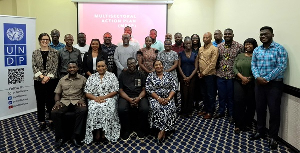General News of Thursday, 8 April 2021
Source: 3news.com
Disconnect between academia and industry worrying – Adutwum
Education Minister Dr Yaw Osei Adutwum has said despite progress made in Ghana education reforms over the past years, education service in the oil-producing West African country has not achieved its intended outcomes.
He stated that an attempt at relevance with the establishment of the University of Ghana, University of Science and Technology, University of Cape Coast, University of Development Studies Polytechnics have not sufficiently yielded the desired result as there has been a certain amount of disconnect between academia and industry.
Dr Adutwum said these while delivering a public lecturer to mark 60 years of the Ghana Institute of Management and Public Administration (GIMPA) on Thursday, April 8.
The event was on the: ‘Creating a 21st-century education system for economic development.’
“Ghana’s Gross Enrolment Ratio (GTER) of 18.8% falls significantly short of the expected 25% in 2020, according to the ESP. This has a significant effect on the production of a quality workforce and Ghana’s GDP growth.
“A study conducted by an Organization for Economic Cooperation and Development (OECD, 2012) concluded that 60% of GDP in France, Norway, Switzerland, and the United Kingdom is contributed by those who have acquired Tertiary Education. As of 2012, these countries had GTR of over 55%.
“The number of engineering graduates produced by a country reflects its status in terms of development and its ability to attract foreign direct investment.
“With a population of about 30 million, Ghana produces about 6000 engineering graduates per year, whereas Vietnam, with a population of about 97 million, produces about 100,000 engineering graduates per annum,” he said.
The Bosomtwe lawmaker added that “Ghana’s Human Capital Index of 44% implies that 56% of the countries productivity is wasted due to poor educational and health outcomes. In particular, learning outcomes at the basic level are significantly off-target defined in the ESP (EGRA &EGMA).
“The 2013 and 2015 EGRA showed that by the end of P2, only 2% or less of public-school pupils were able to read with fluency and comprehension. The results showed the majority of the pupils getting zero scores.
“Currently, there still exist significant disparities between the Northern and Southern parts of our country in terms of learning outcomes
“Currently, Science to humanities ratio stands at 39:61. This contrasts with the desired target of 60:40.
“Our educational system lacks a National assessment at the pre-tertiary level. This deprives the Ministry of getting real-time data for policymaking, especially in planning interventions to improve learning outcomes.
“Other issues include Teacher attrition, Examination malpractice.”
Regarding the importance of higher education in the socio-economic development of the nation, he said “Higher Education Institutions (HEIs) worldwide are centres for educating, analyzing data, creating information, imparting knowledge that is of utmost importance for developing and managing a sustainable future.
“Higher education had in different dimensions contributed to the advancement and application of knowledge with its fundamentals in constructing a knowledge economy to sustain the nation. In the face of challenges linked to economic growth, the role of higher education in bringing about sustainability cannot be over-emphasized. Otoh (2012) found higher education to correlate socio-economic development and, most significantly, a vital economic growth process with its attendant effect on improved productivity, social welfare, and empowerment.”












